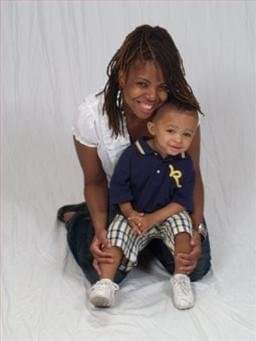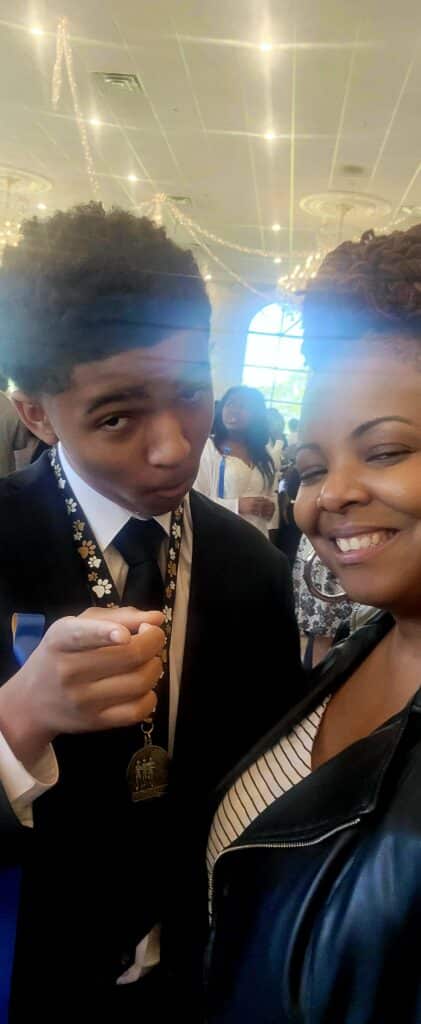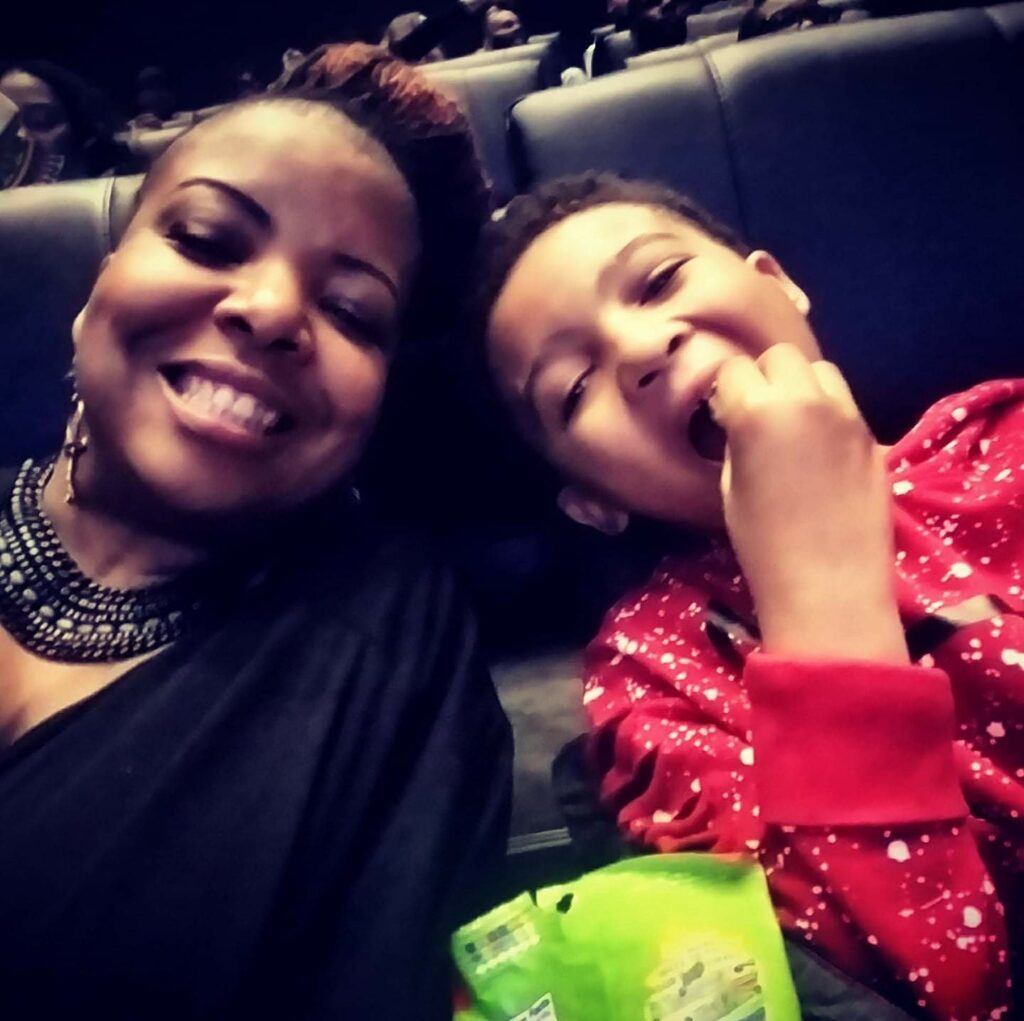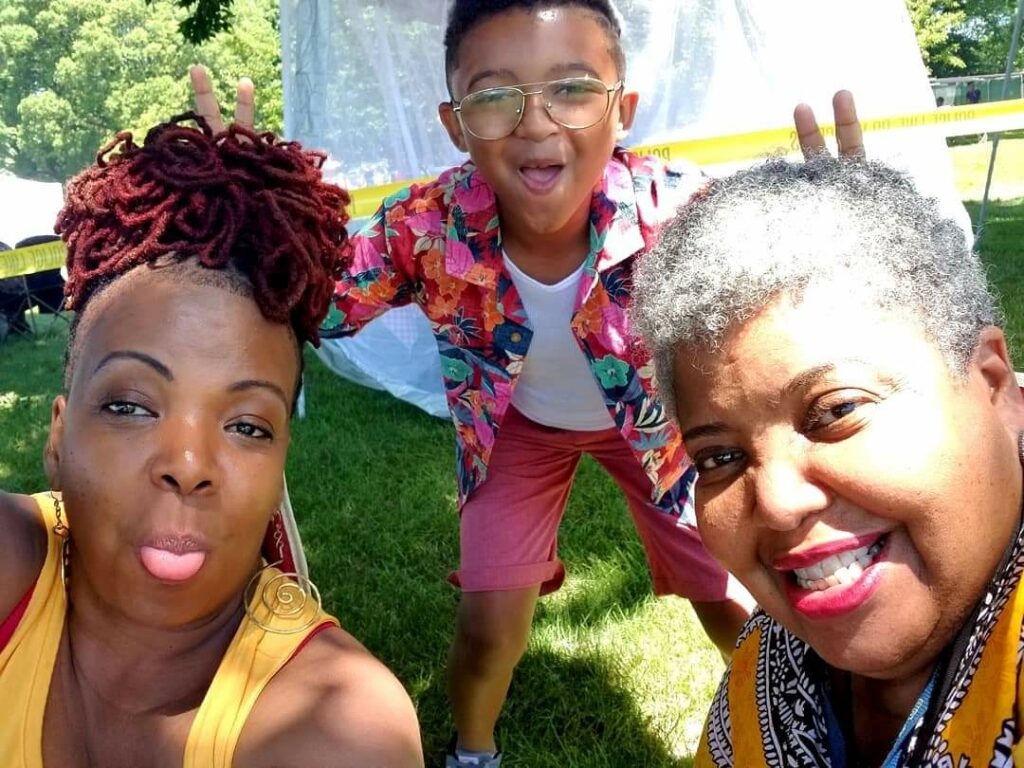
Working at DBSA has helped me build my confidence and find the words to be a better advocate for my 15-year-old son Jordan, who lives with both ADHD and depression, prior to him ever receiving a clinical diagnosis.
Specifically, DBSA has provided me with a safe space to share my concerns, along with the emotional support and educational resources I needed to combat the stigma and bias that my son and I experienced while seeking access to behavioral health services and resources within the Chicago Public School system.
2. As a parent, you have been an advocate for your child, but that isn’t always easy—what have been your biggest learnings and takeaways from advocating for your son’s needs?
I have had quite a few “aha” moments navigating this journey with Jordan. The most significant was learning how professional and cultural biases can act as a barrier to accessing behavioral and mental health care in school, particularly in Black & Brown communities. This is true even when the student and teachers, staff, and/or administrators share the same cultural identity.
Because Jordan was a high-performing student during his middle school years, it was often hard for me to communicate my concerns to his teachers and school staff, because many of them believed that since he didn’t fit the criteria of a person with an intellectual or visible physical disability, that some of the behaviors that he demonstrated in class, which they objected to—zoning out, daydreaming, fidgeting, emotionally shutting down, lacking motivation, carelessly racing through exams and assignments—or missing school assignment altogether, were the results of him just being lazy, spoiled, or attention seeking. Such descriptors were often used in conversation with me in front of Jordan, which began to negatively impact his self-esteem, and I believe ultimately contributed in part to him having suicidal ideation at age of 10 years old.
Even after I began getting more support from my peers and colleagues and medical confirmation from Jordan’s pediatrician, I still found myself in heated debates with educators and other staff about his 504 accommodations, which were often seen as a privilege, rather than a right and often referred to as a “crutch”, and thereby easily dismissed. Despite this opposition, I kept giving voice to my concerns and began to educate myself on the bureaucratic processes that enable such beliefs to go unchecked, and often leave parents feeling helpless.
3. What were the most helpful resources that you used for advocating for your son’s needs?
In addition to collaborating with Jordan’s doctor and seeking support from family, friends, and colleagues, I also continue to utilize educational resources available on our website, DBSAlliance.org. Specifically, DBSA’s Compassionate Language Guide, as well as those found on our Parent and Caregiver page.
4. Why is it important to have resources that speak to your social-cultural identity? How is DBSA creating these resources?
It is my belief that one’s social and cultural identity directly impacts not only the way people view mental wellness, particularly mental health disorders—but also their ability to access quality services and resources.
As a result of institutional racism and economic discrimination, many communities continue to lack equitable access to culturally informed mental health services and resources. The reasons for these disparities are multi-faceted and include issues such as – the current national mental health provider shortages, clinician and research bias, public mistrust of the medical community due to historical abuses inflicted upon people without substantial financial means, as well as individuals in communities of color. These social injustices include early medical experimentation on enslaved, poor and indigenous, and indentured people, lack of government investment in early mental health education, and awareness about job training and career opportunities in the mental health sector. Other examples include the now well-known Henrietta Lacks story and The Tuskegee Experiment and countless lesser-known victims.
These systemic issues, many of which were thought to be our nation’s past, were further exacerbated by the impact of the COVID-19 pandemic, as well as the current U.S. political and social justice climate.
At DBSA the voice of the peer is integrated into everything that we do. We recognize the need for cultural and social awareness and are dedicated to amplifying the voice of all people who have a lived experience with a mood disorder, regardless of race/ethnicity, religious belief, gender and/or sexual orientation, or geographic location.

5. At DBSA you serve as our Senior Manager of Mental Health Equity and External Partnerships, can you tell us a bit about your role, especially as it relates to mental health equity? What is some important work we have done in this space?
DBSA values an individual’s right to determine their own path to wellness. And while we as an organization do not endorse or recommend any one particular medical product or treatment option, we do recognize the life-saving value that access to quality mental health and medical treatment options, as well as mental health research, has on the communities that DBSA represents and serves.
It is my job to help cultivate and sustain relationships with our medical-product development and research partners with the goal to create a two-way dialogue designed to create actionable strategies that help improve the lives of people, who live with mood disorders, specifically depression or bipolar disorder. Because I believe that health care equity is a basic human right and that there is no health without mental health, it is only natural for me to help ensure that individuals who are most vulnerable to being denied access to culturally-informed mental health services and educational resources are an integral part of these efforts.
With the support of industry partners and foundations like Alkermes, Inc. (Alkermes Inspiration Grant), Janssen Pharmaceutical Companies of Johnson & Johnson and its Foundations, and Otsuka Pharmaceuticals, DBSA has been able to secure funding to support the expansion of its national online peer support groups program, which includes mental health-related services and educational resources for peers and care partners in Asian American and Pacific Islanders, Black, LGTBQA+, Rural-Based, and Veteran communities, in addition to supplemental support for our first-of-its-kind Peer Support Apprentice Program, a three-year pilot program, which currently serves individuals with a lived experience with a mood disorder and/or substance abuse dependency in the Black communities throughout Cook County, IL.
6. Especially as we think about mental health equity, what resources do we need more of for parents?
Last year we added educational content to our website on how culture and identity play into mental health and how trauma affects a mood disorder. I would like to see DBSA develop even more cultural and age-specific resources. And in addition to our new online support groups for parents and caregivers of children, teens, and young adults living with mood disorders, I would like to see more live (virtual or in-person) engagement opportunities
7. We know that for parents, self-care is very important—what is something that you do for your own self-care that has worked for your wellness?
As a parent and proud Gen-Xer with both a teen and aging parent to support, who also lives with generalized anxiety disorder—self-care is an essential part of my mental wellness strategy. Some of my daily rituals include meditation and breathwork, aromatherapy, listening to music and inspirational podcasts, and treating myself to monthly manicures and pedicures. I am also learning how to give myself “news breaks” to help reduce negative consumption and reincorporate reading for pleasure into my life.





